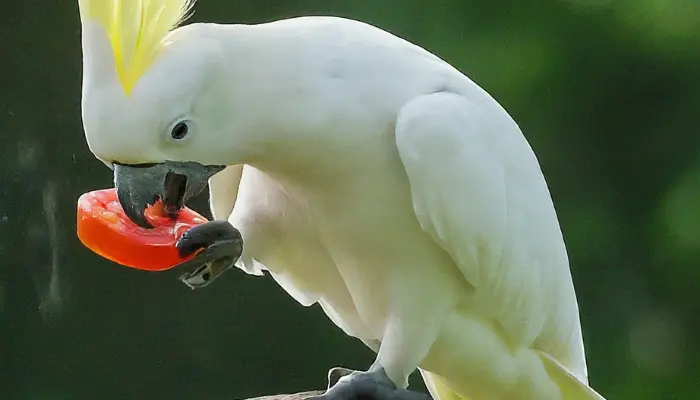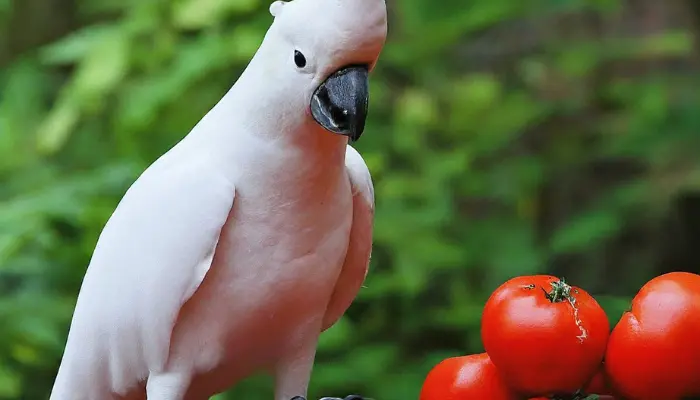No, it is not recommended to feed tomatoes to cockatoos. While tomatoes are not toxic to birds but the seeds and green parts of the tomato plant contain a substance called solanine which can be harmful to birds if ingested in large quantities. Additionally, the acidity of tomatoes can upset a bird’s digestive system. It is best to avoid feeding tomatoes to cockatoos and offer them safer fruits and vegetables instead, such as apples, carrots, and leafy greens. Always introduce new foods gradually and observe how your bird reacts to them.
Nutritional Requirements of Cockatoos
Cockatoos have specific nutritional needs to maintain their health and well-being. Here is an overview.
- Pellets: High-quality pellets formulated specifically for cockatoos should form the foundation of their diet. These pellets are nutritionally balanced and provide essential vitamins, minerals, and other nutrients.
- Fresh Vegetables: Cockatoos should be offered a variety of fresh vegetables daily. This can include leafy greens like kale, spinach, and Swiss chard, as well as vegetables like carrots, broccoli, bell peppers, and squash. These provide essential vitamins and minerals.
- Fresh Fruits: Fruits are also important for cockatoos, but they should be offered in moderation due to their sugar content. Good options include apples, oranges, grapes, berries, and melons.
- Nuts and Seeds: While nuts and seeds can be a part of a cockatoo’s diet, they should be given sparingly as they are high in fat. Examples include almonds, walnuts, pistachios, and sunflower seeds. These can be offered as occasional treats.
- Protein: Cockatoos need protein in their diet, which can be provided through sources like cooked eggs, cooked chicken, and legumes like lentils and beans.
- Calcium: Cockatoos require calcium for strong bones and beak health. This can be provided through foods like dark leafy greens, broccoli, almonds, and fortified pellets. Additionally, offering cuttlebones or mineral blocks can help ensure they get enough calcium.
- Water: Fresh, clean water should be available to cockatoos at all times.
It is important to note that while these are general guidelines, individual cockatoos may have specific dietary needs or preferences. It is always a good idea to consult with an avian veterinarian for personalized dietary recommendations for your cockatoo. Additionally, offering a variety of foods ensures that they receive a wide range of nutrients necessary for their health.

Are Tomatoes Actually Good for Your Cockatoo
Tomatoes are generally safe for cockatoos to consume in moderation. However, there are a few things to keep in mind.
- Moderation: Tomatoes contain solanine, which can be harmful in large amounts. Feed tomatoes to your cockatoo in moderation to prevent any potential issues.
- Remove Seeds and Green Parts: The seeds and green parts of tomatoes contain higher concentrations of solanine. Make sure to remove these parts before feeding tomatoes to your cockatoo.
- Variety: While tomatoes can be a part of your cockatoo’s diet, they shouldn’t be the only food. Ensure a balanced diet consisting of fruits, vegetables, grains, and protein sources to meet your bird’s nutritional needs.
- Observation: Every bird is different, and some may have sensitivities or allergies to certain foods. Watch for any signs of digestive upset or allergic reactions when introducing tomatoes or any new food to your cockatoo’s diet.
Consulting with an avian veterinarian can provide personalized recommendations for your cockatoo’s diet and overall health.
Recommendations for Feeding Tomatoes to Cockatoos
Feeding tomatoes to cockatoos can be done safely if you follow some precautions. Ensure you only offer ripe, red tomatoes to your cockatoos and remove all seeds, stems, and leaves, as these parts contain higher levels of toxins. Moderation is key, as with any new food introduction; offer tomatoes as part of a varied diet, alongside fruits, vegetables, nuts, seeds, and pellets. Monitor your cockatoos closely for any adverse reactions after introducing tomatoes, and consult with an avian veterinarian if you have any concerns. With these precautions in mind, you can safely incorporate tomatoes into your cockatoos’ diet as an occasional treat.
Conclusion
tomatoes may seem like a tempting addition to a cockatoo’s diet. it is best to err on the side of caution. The presence of solanine in the seeds and green parts of tomatoes coupled with their acidic nature which can pose risks to a cockatoo’s health if consumed in large quantities. Instead, focusing on a well-balanced diet that includes high-quality pellets, fresh vegetables, fruits, nuts, seeds, and protein sources tailored to meet the specific nutritional requirements of cockatoos is essential. By avoiding tomatoes and opting for safer alternatives like apples, carrots, and leafy greens Cockatoo owners can ensure the long-term health and well-being of their feathered companions. Remember, always introduce new foods gradually and monitor your bird’s reaction closely and consult with an avian veterinarian for personalized dietary advice.
